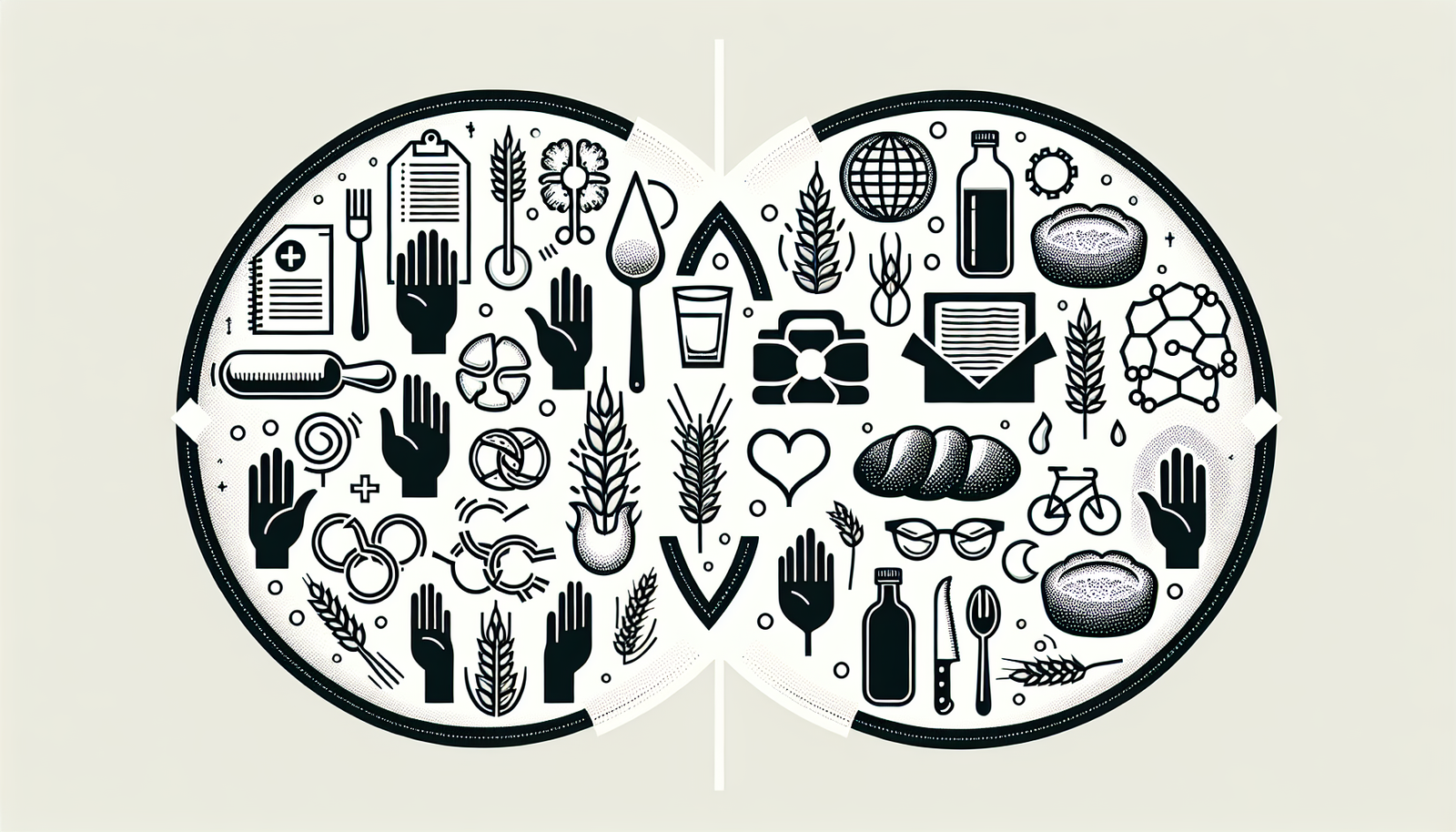Have you ever wondered about the difference between gluten sensitivity and celiac disease? While both involve adverse reactions to gluten, there are distinct characteristics that set them apart. In this article, we will explore the nuances between these two conditions, helping you gain a clearer understanding of how they affect individuals and their dietary choices. So, grab a cup of tea, sit back, and let’s unravel the mystery behind gluten sensitivity and celiac disease together.
Gluten Sensitivity vs. Celiac Disease: What’s the Difference?
Overview of Gluten Sensitivity and Celiac Disease
Gluten sensitivity and celiac disease are two distinct conditions that involve an adverse reaction to gluten, a protein found in wheat, barley, and rye. While they may share some similarities, it is crucial to understand the differences between these two conditions.
Causes and Triggers
Gluten sensitivity, also known as non-celiac gluten sensitivity (NCGS), is a condition in which individuals experience symptoms similar to those with celiac disease but lack the accompanying intestinal damage and autoimmunity. The exact cause of NCGS is unknown, but it is believed to involve an immune response and the gut’s inability to properly digest gluten.
Celiac disease, on the other hand, is an autoimmune disorder triggered by the ingestion of gluten. In individuals with celiac disease, consumption of gluten leads to an immune response that attacks the lining of the small intestine. This damage can result in nutrient malabsorption and various symptoms.

Symptoms and Diagnosis
The symptoms of gluten sensitivity and celiac disease can overlap, but there are some distinguishing factors. Both conditions can manifest with gastrointestinal symptoms such as abdominal pain, bloating, and diarrhea. However, celiac disease may also cause more severe symptoms like weight loss, recurring mouth sores, and fatigue.
To diagnose gluten sensitivity, doctors typically perform a process of exclusion, ruling out other conditions and conducting a gluten elimination trial. However, celiac disease diagnosis involves specific blood tests and may require an endoscopy to assess intestinal damage.
Gluten Sensitivity: Non-Celiac Gluten Sensitivity (NCGS)
Non-celiac gluten sensitivity refers to individuals who experience symptoms similar to those of celiac disease without the accompanying small intestinal damage or autoimmune response. While the exact mechanisms behind NCGS are not yet fully understood, it is recognized as a distinct condition that affects a growing number of individuals.
Unlike celiac disease, NCGS does not involve the same long-term complications or increased risk of associated conditions. It is important to note that people with NCGS should still avoid gluten to alleviate their symptoms and maintain optimal health.

Celiac Disease: An Autoimmune Disorder
Celiac disease is an autoimmune disorder characterized by the body’s immune system mistakenly attacking its own tissues when gluten is ingested. This immune response triggers inflammation in the small intestine, leading to damage to the villi, the tiny finger-like projections responsible for nutrient absorption.
Unlike gluten sensitivity, celiac disease has more severe consequences and complications if left untreated. Over time, the intestinal damage can lead to malnutrition, osteoporosis, anemia, fertility issues, and an increased risk of certain cancers.
Genetic Factors
Both gluten sensitivity and celiac disease have underlying genetic components, but the genetic factors differ between the two conditions. Gluten sensitivity does not appear to have a strong genetic association, whereas celiac disease is strongly linked to specific human leukocyte antigen (HLA) genes.
If you have a first-degree relative (parent, sibling, or child) with celiac disease, you have a higher risk of developing the condition as well. Genetic testing can provide valuable information but is not definitive in determining whether someone will develop celiac disease or gluten sensitivity.
Intestinal Damage and Long-term Effects
While both conditions involve an adverse reaction to gluten, the extent of intestinal damage sets them apart. In celiac disease, the immune response caused by gluten leads to significant villous atrophy and a flattening of the small bowel lining over time.
In contrast, individuals with gluten sensitivity do not experience the same intestinal damage. However, it is important to note that untreated celiac disease can result in long-term complications, including osteoporosis, malnutrition, neurological disorders, and an increased risk of certain cancers.
Treatment and Management
The primary treatment for both gluten sensitivity and celiac disease is adherence to a strict gluten-free diet. By eliminating gluten-containing foods and products, individuals can alleviate their symptoms and prevent further damage to the small intestine.
It is crucial for individuals with celiac disease to be vigilant about their diet, as even small amounts of gluten can trigger an immune response and worsen their condition. In contrast, individuals with gluten sensitivity may tolerate small amounts of gluten without experiencing significant symptoms.
Gluten-Free Diet and Lifestyle
Adopting a gluten-free diet and lifestyle is necessary for individuals with gluten sensitivity and celiac disease. This involves avoiding foods and ingredients that contain wheat, barley, and rye. Thankfully, there are now numerous gluten-free alternatives available, making it easier to maintain a balanced and enjoyable diet.
In addition to food, individuals with celiac disease and gluten sensitivity should also be cautious about the gluten content in medications, cosmetics, and even cross-contamination in kitchens or restaurants.
Potential Complications and Associated Conditions
While gluten sensitivity does not carry the same long-term complications as celiac disease, it is important to recognize that individuals with both conditions may be at an increased risk of developing other autoimmune conditions. These may include type 1 diabetes, thyroid disorders, rheumatoid arthritis, and dermatitis herpetiformis, a skin condition associated with celiac disease.
Regular check-ups with medical professionals, including gastroenterologists and dietitians, can help monitor overall health and address any potential complications or associated conditions.
In conclusion, understanding the differences between gluten sensitivity and celiac disease is essential for proper diagnosis, management, and treatment. While gluten sensitivity may not involve the same intestinal damage as celiac disease, both conditions require a gluten-free lifestyle to maintain optimal health and prevent symptoms. If you suspect you have an adverse reaction to gluten, consulting with a healthcare professional is paramount to receiving an accurate diagnosis and appropriate guidance for your specific needs.

